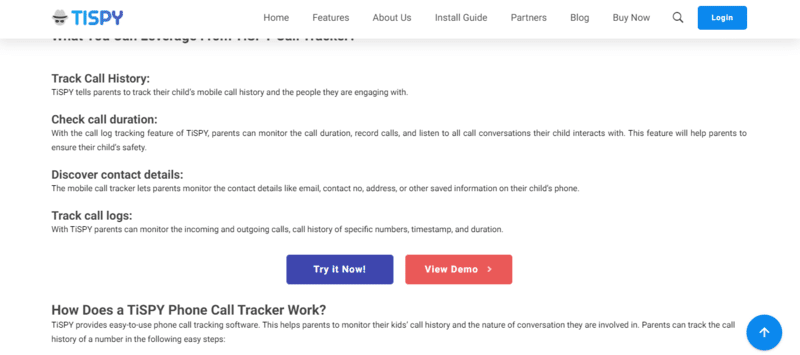Is your child always talking to someone on call?
Kids and teens growing up in the smartphone era, get early access to phones. At their gullible and inexperienced age they are prone to fall prey to scams and frauds.
Kids are the easiest targets for scammers and evil elements. Because of two factors Firstly, the kids are inexperienced and require more time to discover the scam. Secondly, they are easy to lure. Therefore, it becomes necessary for parents to monitor the call logs of their kids to prevent them from potential fraud calls.
In the following article, we are talking about the types of phone call scams and how parents can save their children.
Potential Fraud Calls: Types Of Phone Scams Your Child Can Get
1. Online Shopping Scam

Scammers find kids their easiest prey for their ill intentions. Teenagers and kids are easy to lure with scams like online shopping or free games. Scammers reach out to the kids through various sources to attract them to share their bank accounts or personal details. This may result in scams like cyberbullying or identity theft.
They either send out ads for things luring the kids to buy them. Once you pay for the product, it never gets delivered and the scammer might have your transaction details. They may also attract kids to pay for higher levels or learn cheat tricks for popular games. Thus, scammers pick different ways to attract kids to click on a false link, buy from unknown websites, or play free games to fulfill their intentions.
2. Social Media Scam
The huge user base of social media serves as a primary platform for scammers to attack. Kids are prone to sharing information on social media. It may result in identity theft or hacking of accounts.
The desire for more and more popularity gives birth to another way of scamming. Getting likes, recognition, and more and more followers are used as bait by scammers to attract kids or teens. They may ask for a specific amount to increase followers on the kid’s social media account. Once paid they gain a few followers and gradually ask for more, resulting in a scam.
3. Identity Theft

This is the most common way of scamming kids. Through online shopping scams or social media scams, SMS, phone calls, or emails, scammers lure kids into sharing their personal information. This information is further misused either to blackmail kids or result in a financial scam. Any kind of interaction that is not secure can contribute to identity theft.At a young age kids are not able to make out the genuineness of a conversation and tend to share a lot of information. This is all used against them through identity theft.
4. Scholarship scam
The finances of high education often worry young kids about going for scholarships and grants. They start searching for various scholarships and grant options. Scammers target these kids through potential fraud calls with an alluring grant offer but with a clause for a deposit amount. Kids often fall prey to these alluring offers and deposit the amount. The cheque sent by the fraudster bounces but the deposited amount never comes back. The information shared while applying for these fake scholarships may also contribute to identity theft.
5. Spam Contest Calls

Scammers call their targets with alluring calls like they have won a contest. The contest or luck draw potential fraud calls are the most common ways opted by the spam callers. These spam callers call their targets and lure them into winning a contest with prizes that are too good to be true. It might be a LED TV, foreign vacations, a car, or a high cash prize. They ask kids to share personal details and then use this information for different kinds of frauds like identity theft or financial fraud.
What To Do With Spam Calls?
1. Teach Kids To Not Submit Phone Numbers On Spam Sites
An open conversation with kids always works. Parents should educate kids about scams and frauds happening today. They should tell them the importance of cybersecurity and ways to avoid falling for spam calls. Kids tend to share information like phone numbers publicly or on spam sites. Parents can teach them to not share their contact information publicly. They should teach them about spam sites and tell them not to share their phone numbers on these sites.
Use TiSPY To Track And Block Spam Calls On Kid Phones

If you as parents are thinking about how to stop spam calls on your kid’s phone? Parental control apps like TiSPY can come at your rescue. You can install TiSPY on your kid’s phones and track their call logs remotely. The parental control app works in hidden mode and does not let your kid know of the call tracking. With the call log tracking feature of TiSPY parents can monitor the incoming and outgoing calls on their kid’s phones. They can also find out the caller’s details. The other added advantage of TiSPY is that parents can identify the spam callers and block them from calling again on their kid’s phones.
Teach Kids To Never Click On Links From Anyone They Don’t Know Or Trust
Even after regular monitoring of call logs kids might fall prey to scams. Their curiosity to know things or the alluring offers of scammers might attract them to click on spam sites. Parents should teach the kids about spam sites and how they can fall prey to a scam like identity theft just by clicking on it. They should teach kids ways to make sure they trust the site. Parents can educate kids about never clicking on links from untrusted sources. They can also make kids aware of the methods the scammers adopt to attract them.
Conclusion
In the mobile-first world, even scammers are adopting different ways to fulfill their intentions. Kids are the most targeted age group for scammers. The young age and inexperience of kids result in them falling prey to scams. Parents should educate kids about these scams to ensure they do not fall prey to them. Parental control apps like TiSPY can aid/help parents to track their kid’s call logs and save them from any potential fraud calls.
